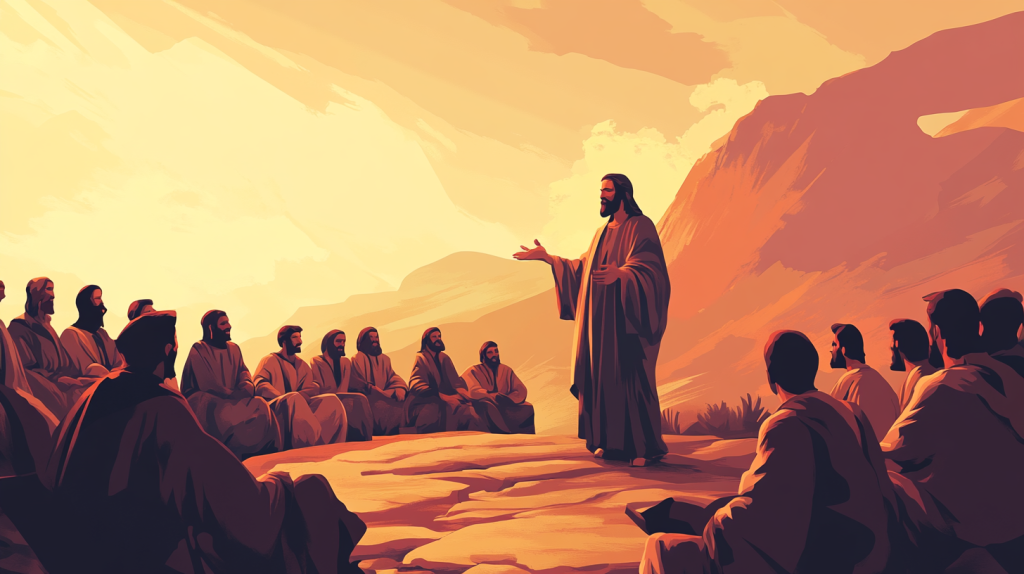
As you prepare to teach Doctrine and Covenants 71–75 in Sunday School this week, you’ll find timely lessons about boldly sharing the gospel, trusting in the Lord’s timing, and the importance of supporting one another in the work of the Lord. These sections show how the early Saints faced opposition with faith and how the Lord provided guidance and strength through revelation. To help make your lesson more engaging and Spirit-filled, we’ve gathered a variety of thoughtful discussion questions, simple object lesson ideas, and personal sharing prompts. These teaching tools are designed to encourage meaningful participation and help your class connect the scriptures to their own experiences in today’s world.

To download our free lesson help + customizable Canva Template, click here: https://otherthanamom.myflodesk.com/dc71-75
The Spirit will guide me as I proclaim the Savior’s gospel.
Engaging Questions:
- What does it mean to you to “proclaim the Savior’s gospel”? How can that look different for different people?
- Have you ever had a moment when you felt guided by the Spirit while sharing your testimony or beliefs?
- What helps you recognize when the Holy Ghost is prompting you to speak or act?
- Why do you think the Lord wants us to rely on the Spirit rather than just our own words or knowledge when sharing the gospel?
- What are some fears you have about sharing the gospel, and how can the Spirit help with those?
- Who in your life might be open to hearing more about Jesus Christ? What small steps could you take?
- What spiritual gifts or talents do you have that help you share the gospel in your own way?
- How can you create opportunities for the Spirit to guide you each day—even in ordinary situations?
- How does your example “proclaim” the gospel without using words? Can the Spirit guide that too?
- What’s one way you can invite the Spirit more into your conversations this week—especially when talking about things that matter most?
Object Lessons:
1. The Blindfolded Path (Needing a Guide)
Materials:
- A blindfold
- Obstacles or taped line on the floor
- A helper to give verbal directions
Lesson Overview:
Blindfold a volunteer and ask them to walk across the room with only spoken guidance from a trusted friend. This illustrates that we may not always “see” how to share the gospel, but the Holy Ghost can guide our steps if we listen and trust.
Discussion Points:
- What happens when we ignore or doubt the guide’s voice?
- How does this relate to spiritual promptings in missionary work or testimony sharing?
2. The GPS Analogy
Materials:
- Picture of a GPS screen or use a phone with maps app open
Lesson Overview:
Explain how GPS only works if it’s turned on and listened to. Similarly, the Spirit is our spiritual GPS in sharing the gospel. Sometimes He prompts a detour or says “wait,” but He always leads to the right place if we follow.
Discussion Points:
- How can we keep our “spiritual GPS” tuned in?
- What has the Spirit prompted you to say or do in a gospel conversation?
3. The Whisper Game
Materials:
- None; just a group of participants
Lesson Overview:
Start a whisper chain around the room. At the end, ask what the message was and compare it to the original. Talk about how earthly voices and distractions can distort truth, but the Spirit always gives us pure truth if we’re quiet enough to hear it.
Discussion Points:
- What helps you recognize the Spirit’s voice above others?
- Why is personal revelation key when sharing the gospel?
4. The Paper Airplane
Materials:
- Paper to fold an airplane
- A gentle fan or breath of air
Lesson Overview:
Make a paper airplane and ask what makes it fly. Then blow gently behind it or use a fan. Explain that we are like the plane—willing and shaped to fly, but it’s the wind of the Spirit that carries the message far and makes it soar.
Discussion Points:
- What does “letting the Spirit carry your message” look like in real life?
- What can you do to stay open to His direction?
5. The Empty Cup vs. the Filled Cup
Materials:
- Two cups: one empty, one filled with water
Lesson Overview:
Ask which cup could quench someone’s thirst. Explain that we must be filled with the Spirit before we can effectively share the gospel. As we study, pray, and keep covenants, we’ll be ready vessels for the Spirit to use.
Discussion Points:
- What helps fill your “cup” with the Spirit?
- How do you know when you’re spiritually ready to share truth?
6. The Flashlight with and without Batteries
Materials:
- A flashlight, with and without batteries
Lesson Overview:
Show that a flashlight without batteries can’t give light, no matter how willing it is. With batteries (representing the Holy Ghost), it can shine clearly in darkness. Similarly, our gospel sharing only lights others when powered by the Spirit.
Discussion Points:
- How do we “charge our batteries” spiritually?
- Have you ever had an experience where the Spirit made your words more powerful?
Personal Sharing Prompts:
- Think of a time when you felt prompted to share your testimony with someone. What happened, and how did the Spirit help you?
- Think of a time when you didn’t know what to say, but the words came as you opened your mouth. How did that strengthen your trust in the Holy Ghost?
- Think of a time when you shared a gospel truth that brought peace or clarity to someone else. How did you recognize the Spirit in that moment?
- Think of a time when you were nervous or unsure about sharing the gospel. What helped you move forward, and how did the Lord support you?
- Think of a time when you were guided by the Spirit to a specific person or opportunity to share the gospel. What was the result?
- Think of a time when the Spirit confirmed your words as you bore your testimony. How did that feel, and what did it teach you?
- Think of a time when you used the scriptures to teach or lift someone, and the message seemed to be exactly what they needed. How did the Spirit guide that experience?
- Think of a time when you shared something simple about Jesus Christ and it brought light to a conversation. What did you learn about everyday discipleship?
- Think of a time when you felt the Spirit guiding you to be bold in your witness of Christ. What helped you overcome fear or hesitation?
- Think of a time when you prayed for help to share the gospel, and the Lord opened a door. How did that strengthen your testimony of His timing?
The Lord blesses me through the ministry of leaders like bishops.
Engaging Questions:
- How have you seen a bishop or other Church leader be an instrument in the Lord’s hands?
- What Christlike qualities do you notice in the leaders who serve you?
- Why do you think the Lord calls imperfect people to lead His Church?
- Have you ever received personal guidance or comfort through a Church leader? How did it help you?
- What can we do to support and sustain our leaders as they try to serve with love?
- In what ways are bishops and other leaders different from just being “in charge”?
- How can you better listen for and act on spiritual counsel from your leaders?
- What blessings have you seen in your ward or branch because of faithful leadership?
- How does ministering to others prepare someone for leadership—and how does leadership deepen their ministering?
- What can you do to help make your leaders’ burdens lighter? Why does that matter to the Lord?
Object Lessons:
1. The Shepherd and the Sheep
Materials:
- A simple stuffed sheep or paper sheep cutouts
- A shepherd staff or walking stick
Lesson Overview:
Talk about the bishop as a modern shepherd. Just like a shepherd knows each sheep and protects them, bishops are called to watch over the flock. Christ is the Good Shepherd, and bishops act in His name to guide and protect His people.
Discussion Points:
- How has a bishop or leader helped “gather” or guide you?
- What does it mean to sustain a bishop as a shepherd?
2. The Lifeguard Analogy
Materials:
- Picture of a lifeguard, whistle, or life preserver
Lesson Overview:
Explain that a lifeguard’s job is to watch, protect, and rescue when needed—but they can’t force someone to stay safe. A bishop watches over the ward and is spiritually trained to notice danger, offer support, and rescue through counsel and priesthood help.
Discussion Points:
- What qualities make a good lifeguard or leader?
- How can we make it easier for leaders to serve us?
3. The Mailbox: Receiving a Message from God
Materials:
- A mailbox prop or envelope
Lesson Overview:
Show a sealed envelope and say, “This is a message from someone who cares about you, but they had to send it through a messenger.” The bishop is like the mail carrier, delivering personalized help and instruction from the Lord.
Discussion Points:
- How can we recognize when a bishop’s counsel is inspired?
- What are ways we can respond respectfully to church leaders?
4. The Tool in the Lord’s Hands
Materials:
- A toolbox and a few tools (hammer, wrench, etc.)
Lesson Overview:
Explain that the bishop is a tool in the Lord’s hands—just like a hammer can build a house but only when used by a skilled builder. God uses bishops and other leaders to build His kingdom and bless individuals.
Discussion Points:
- How can you show gratitude to those God uses to help you?
- What kind of “tool” might you be in His hands?
5. The Lighthouse
Materials:
- Picture or model of a lighthouse
Lesson Overview:
The bishop is like a lighthouse—not the destination, but a guiding light that helps us stay away from spiritual danger. Just like sailors trust the lighthouse, we can trust priesthood leaders who guide us with Christ’s light.
Discussion Points:
- How can you better follow inspired guidance in your life?
- What does a “lighthouse moment” with a bishop look like?
6. The Backpack Check
Materials:
- A backpack filled with various items—some helpful (scriptures, notebook), some heavy or unnecessary (bricks, random objects)
Lesson Overview:
Have a volunteer carry the pack, then remove the extra weight with help from a “bishop.” Explain that a bishop helps us sort spiritual burdens, offers repentance support, and helps us carry only what we really need.
Discussion Points:
- Why is it important to be honest with spiritual leaders?
- How can repentance and counsel lighten our burdens?
Personal Sharing Prompts:
- Think of a time when a bishop or other Church leader gave you counsel that helped you feel the Lord’s love. What did you learn from their words or actions?
- Think of a time when a Church leader helped you through a difficult decision or trial. How did their support strengthen your faith?
- Think of a time when a bishop or leader saw something in you that you didn’t yet see in yourself. How did that impact your confidence or testimony?
- Think of a time when you felt prompted to reach out to your bishop or branch president. What happened, and how did the Lord guide that experience?
- Think of a time when a Church leader gave you a calling or assignment that stretched you. How did their encouragement and stewardship bless your growth?
- Think of a time when a bishop offered a priesthood blessing or prayer that brought peace or direction. What did you feel during that moment?
- Think of a time when you saw a leader serve faithfully despite challenges. What did their example teach you about Christlike leadership?
- Think of a time when a bishop or Relief Society/Young Women/Primary leader helped create a sense of belonging for you or someone you love. What did they do that made a difference?
- Think of a time when a Church leader listened with compassion and made you feel understood. How did the Lord minister to you through them?
- Think of a time when you prayed for help and a Church leader was part of the answer. How did that help you see God’s hand in your life?
I have many opportunities to share the Savior’s gospel.
Engaging Questions:
- What are some everyday places or situations where you can naturally share your beliefs about Jesus Christ?
- Have you ever shared the gospel without even realizing it? What did that look like?
- Why do you think the Lord wants you—specifically—to share His gospel?
- What’s one small way you could share something about your faith this week?
- How does the way you live your life speak about your testimony of Jesus Christ?
- What helps you feel more confident about sharing the gospel with others?
- When have you felt the Spirit guide you to say something uplifting or meaningful to someone?
- How can social media or technology be used to share the gospel in positive, authentic ways?
- What would you say if someone asked, “Why does Jesus matter to you?”
- Who in your life might be prepared to hear more about the Savior—and how can you prepare yourself to share?
Object Lessons:
1. The Salt Shaker
Materials:
- A salt shaker and unsalted food (e.g., a plain cracker or slice of fruit)
Lesson Overview:
Have someone taste the plain item and then taste it again with a pinch of salt. Just a little salt enhances the flavor. Like salt, our testimonies—even when small—can enhance someone’s life. We don’t need to preach sermons to make a difference.
Discussion Points:
- How can a small comment or kind act be a form of sharing the gospel?
- When have you “flavored” someone’s day with Christ’s light?
2. The Dandelion Seeds
Materials:
- A dandelion puff (real or paper model) or image/video
Lesson Overview:
Blow on the dandelion and watch the seeds scatter. One plant can spread dozens of seeds, each with the potential to grow. When we share the gospel, even in simple ways, the message can go further than we imagine.
Discussion Points:
- Have you ever said something that impacted someone more than you realized?
- What kinds of conversations could “plant seeds” of truth?
3. The Domino Effect
Materials:
- A few dominoes lined up in a row
Lesson Overview:
Tip one domino and watch the others fall. Emphasize that one small act—one testimony—can start a spiritual chain reaction. You may not see the final result, but your courage to speak can bless generations.
Discussion Points:
- Who has tipped a “domino” in your life?
- What might happen if you opened your mouth in faith?
4. The Pebble in the Pond
Materials:
- A bowl of water and a small pebble
Lesson Overview:
Drop the pebble into the water and watch the ripples. Sharing the gospel—whether through words, example, or invitation—creates ripples of influence. Every effort matters.
Discussion Points:
- What’s one simple ripple you could create this week?
- Who might be within your circle of influence?
5. The Flashlight in the Dark
Materials:
- A flashlight
Lesson Overview:
Turn off the lights and shine the flashlight. Ask: “Did I light up the whole room?” No—but you lit up enough to help someone find the path. You don’t need to “save the world,” just shine where you are.
Discussion Points:
- What settings (school, work, home) need your light?
- What stops us from turning it on more often?
6. The Toolbox
Materials:
- A toolbox with a variety of tools
Lesson Overview:
Each tool has a different purpose, but all are useful. Likewise, each person has a unique way of sharing the gospel—through words, music, service, writing, art, or kindness. God gives you opportunities that match your “tool.”
Discussion Points:
- What “tool” has the Lord given you to share His gospel?
- How can you recognize and act on those moments?
Personal Sharing Prompts:
- Think of a time when a gospel conversation came up naturally in everyday life. How did you recognize it as an opportunity to testify of Christ?
- Think of a time when someone asked you a question about your faith. How did you respond, and what did you learn from the experience?
- Think of a time when you felt nervous to share the gospel but did it anyway. What helped you move forward, and how did the Spirit help?
- Think of a time when you were able to share your beliefs through a small act of kindness or service. How did that reflect the Savior’s love?
- Think of a time when you used social media, a letter, or a message to share a truth about Jesus Christ. What prompted you, and what was the result?
- Think of a time when your example—more than your words—invited someone to learn more about the gospel. How did you come to realize it made a difference?
- Think of a time when you invited someone to church, a youth activity, or a gospel discussion. How did you feel about extending the invitation?
- Think of a time when you were surprised that someone was open to hearing your testimony. What helped you recognize their readiness?
- Think of a time when sharing your testimony strengthened your own faith. How did bearing witness bless both you and the listener?
- Think of a time when you prayed for a missionary opportunity—and it came. What did you learn about the Lord’s timing and your role in His work?
“Labor with your might … proclaiming the truth.”
Engaging Questions:
- What does it mean to you to “labor with your might” in proclaiming truth?
- What truths about Jesus Christ and His gospel are most important to you to share? Why?
- How can you proclaim truth even when it’s not popular or easy?
- What’s the difference between sharing truth boldly and sharing it with love? Can we do both?
- Who has been a powerful example to you of someone who labors with their might for the gospel?
- What unique talents or circumstances do you have that can help you proclaim truth in your own way?
- How can hard work in gospel service strengthen your personal testimony?
- What does “laboring” look like in the digital age—how can we use social media or other tools for good?
- How do you stay motivated when it feels like your efforts to share the gospel aren’t making a difference?
- What is one way you can labor more intentionally for the Lord this week?
Object Lessons:
1. The Unplugged Power Tool
Materials:
- A drill or mixer that’s unplugged (or has no batteries)
Lesson Overview:
Show the tool and ask what it’s for. Then try to use it while unplugged—no matter how hard you try, it doesn’t work without power. Our efforts to share the gospel must be connected to real effort and the Spirit. It takes labor and power to be effective.
Discussion Points:
- What are you doing to “plug in” spiritually before sharing truth?
- What’s the difference between passive and active effort?
2. The Shovel and the Seed
Materials:
- A shovel, dirt, and a seed or plant
Lesson Overview:
Explain that you can’t grow fruit without labor—digging, watering, waiting. Sharing the gospel is like planting: we must put in the work, even when we don’t see results right away. Labor is part of the Lord’s process.
Discussion Points:
- Why is consistent effort needed in gospel service?
- What helps you keep going even when results are slow?
3. The Candle vs. the Mirror
Materials:
- A lit candle and a mirror
Lesson Overview:
A mirror reflects light, but a candle produces it through active effort. We are called not just to reflect others’ testimonies, but to burn with our own and labor to share it. That’s proclaiming with might.
Discussion Points:
- How do we move from being reflectors to being active bearers of light?
- What fuels your spiritual fire?
4. The Rowboat Analogy
Materials:
- Image or toy rowboat and paddles
Lesson Overview:
Explain that if you sit in a rowboat and never paddle, you won’t move. You must labor with your might to go forward. Likewise, when proclaiming truth, it’s not about sitting back but picking up your oars and rowing with faith.
Discussion Points:
- What “paddling” can you do this week to share the gospel?
- What slows your spiritual momentum, and how can you change that?
5. The Half-Built Puzzle
Materials:
- A partially assembled puzzle
Lesson Overview:
Show the unfinished puzzle and say, “This could be beautiful, but someone has to put in the effort.” Sharing the gospel is like finishing God’s masterpiece—we’re helping others see the big picture, but it requires effort and time.
Discussion Points:
- What truths has God asked you to proclaim to help complete His work?
- How can you be more consistent in contributing to that picture?
6. The Lemonade Stand
Materials:
- Lemonade (real or pictured), cups, sign
Lesson Overview:
Set up a mock lemonade stand. Explain that no one would come if you just sat quietly and hoped someone noticed. You need to prepare, invite, and be willing to speak up. Proclaiming truth takes both preparation and proactive effort.
Discussion Points:
- What are ways you can invite others to the gospel “stand”?
- How can you prepare now to labor more effectively?
Personal Sharing Prompts:
- Think of a time when you gave your best effort to share the gospel. What motivated you, and how did you feel about the outcome?
- Think of a time when you felt weary in your efforts to live or teach the truth, but you kept going. What gave you the strength to persevere?
- Think of a time when you prepared diligently to teach or testify of the Savior. How did your preparation invite the Spirit?
- Think of a time when you used your talents or unique personality to help someone understand a gospel truth. What did you learn about the Lord’s ability to use you?
- Think of a time when the truth of the gospel was challenged and you stood firm. What helped you stay anchored in your testimony?
- Think of a time when you saw the impact of consistent gospel service, even in small ways. How did that strengthen your resolve to labor faithfully?
- Think of a time when you were part of a team or companionship working to share the gospel. How did unity and effort make a difference?
- Think of a time when your diligence in proclaiming truth bore fruit—whether immediately or later. How did that increase your trust in the Lord’s timing?
- Think of a time when you felt prompted to share a specific truth with someone. What was the result, and what did you learn?
- Think of a time when you felt joy in serving the Lord with all your heart, might, mind, and strength. How did that experience shape your discipleship?




Leave a Reply